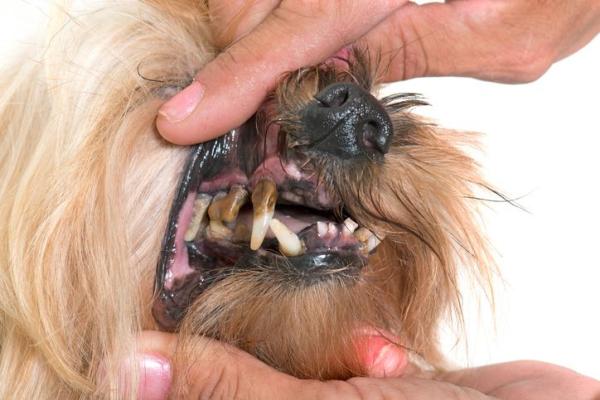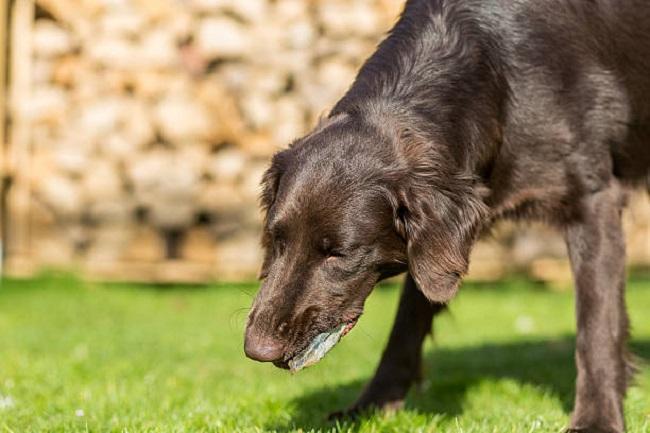My Dog Is Bleeding From the Mouth



See files for Dogs
When we see blood coming from our dog's mouth, it is understandable we fear for their well-being. Blood around a dog's mouth may be due to oral health problems, but we also need to consider the fact the mouth is the beginning of the digestive tract. It is possible the blood is from the gastrointestinal or even respiratory systems. This implies a serious health problem which requires immediate treatment. To understand why a dog is bleeding from their mouth, we need to look at the context. This includes the color, amount and consistency of the blood.
At AnimalWised, we look at the reasons why my dog is bleeding from the mouth. We understand the possible causes and treatment of this problem to best ensure your dog's overall health.
Why is my dog bleeding from the mouth?
When we see blood in or around our dog's mouth, we should know there are various underlying causes. To help us better understand what these may be, we need to make a key distinction. We need to determine whether the blood is fresh or old.
- Fresh blood: fresh blood from your dog's mouth will be bright red. This implies the blood is coming from either the mouth itself or from the upper part of their digestive tract.
- Old blood: this will be darker red or even brown in color, implying it comes from lower in the digestive system and may even be partially digested. Both are worrying, but the reasons for the blood will differ and treatment is often more complicated if the issue is lower in the gastrointestinal system.
Another important factor is whether the bleeding is acute or chronic. Small oral health problems may cause minor bleeding which resolves itself after a short period. Chronic bleeding means there is a more serious issue affecting their organism. We need to observe for concurrent symptoms such as lethargy, paleness in the dog's mucous membranes, breathing difficulties, problems eating and other signs. These will need to be related to the veterinarian to help achieve a correct diagnosis. Severe chronic bleeding is life-threatening and may require intensive treatment.
Below we look at the most common reasons why my dog's mouth is bleeding in more detail.
Oral health problems
One of the most common reasons why a dog's mouth is bleeding is due to oral health problems. Dogs are inquisitive by nature and use their mouths to interact with their environment. It is common for them to bite or chew foreign objects, even if they have no intention to ingest them. For example, dogs often chew on sticks or other hard objects which can shatter. Pieces of these objects can pierce their gums and cause minor temporary bleeding.
Small cuts and wounds in a dog's mouth will cause fresh blood to appear. The mucous membranes of the dog's gums usually heal relatively quickly. However, we should look in their mouths to observe for the wound and gauge its severity. Abscesses and broken teeth can also result in bleeding.
Blood can also appear in a dog's mouth due to dental and gum disease. This is especially the case if the dog is bleeding from their gums. This is due to gum inflammation known as gingivitis. We may be able to observe an excess of plaque or tartar, halitosis, receding gums or even pain when chewing. If a dog has severe periodontal disease, the pain can be intense and make eating difficult. This is especially the case if they eat dry kibble.
A potentially very serious health problem in dogs which can cause mouth bleeding in an oral tumor. These can be benign, such as an epulis in dogs. This is a relatively common oral tumor which should be removed, but won't threaten their overall health. Conversely, x are very serious and will need immediate treatment. If these tumors metastasize to other parts of the body, the treatment will be more difficult.
In puppies, it is possible to see a little blood when they lose their baby teeth. The bleeding should not be prolific if this is the case. Otherwise, bleeding due to dental problems will need veterinary assistance. Once the initial issue is addressed, we will need to ensure we help maintain their dental hygiene.

Respiratory system problems
Although we may see blood in the dog's mouth, it is possible the blood is coming from somewhere else. Since the respiratory tract is connected to the throat and mouth, it is possible blood is coming from the lungs, throat or any part of the anatomy connected to the respiratory system.
Respiratory problems which can cause bleeding from the mouth include:
- Bacterial infections
- Viral infections (e.g. canine distemper)
- Tumors
- Polyps
- Cold/flu
When the dog coughs and gags or sneezes for a prolonged period of time, these symptoms may result in bleeding from the respiratory tract. This bleeding will stop when the underlying problem is treated.
Even if the bleeding is minimal, it is important we take them to a veterinarian. There are some serious infections and medical problems which can have minimal symptoms, but still pose a serious threat to the health of the dog. Correct diagnosis and proper treatment are required.
Gastrointestinal problems
As stated above, old blood usually implies there is a problem further down in the gastrointestinal system. This is usually because the blood comes from the mouth in the form of vomit or regurgitation. It is possible bleeding in the stomach will be vomited out quickly, meaning the blood will appear fresh. However, gastric acid will start to digest the blood after only a short time, resulting in the appearance of dark-colored blood.
When a dog has internal bleeding in the gastrointestinal system it is possible they will regurgitate blood through the mouth. However, it is much more common for the blood to exit through the anus since the digestive flow is directed in this way. When the dog is bleeding from the mouth and anus simultaneously, it implies a very serious medical problem.
The causes of bleeding from the mouth in dogs due to gastrointestinal problems include:
- Gastritis: gastritis in dogs is the term for inflammation of the gastrointestinal mucosa. The causes are varied, but it can often result in internal bleeding. Intoxication is a common problem as dogs often eat things they shouldn't. This could be due to eating inorganic material or being poisoned by a certain substance.
- Infections: infections can also cause gastritis, but they are incredibly varied and have different symptoms. Viral, bacterial and fungal infections can result in internal bleeding.
- Parasites: internal parasites can affect the health of the dog to the point they bleed internally. This can be due to the physical action of the parasites or if they compromise the immunity and lead to secondary health problems.
- Ulcers: gastrointestinal ulcers are a common cause of blood coming from the dog's gastrointestinal system. This will happen if they rupture which can be life threatening.
- Medication side-effects: one cause of ulcers in dogs is the result of taking medication. Certain medications are harsh on the dog's digestive system and can rupture its mucosa. Some medications require additional medications to be taken in order to prevent these secondary problems.
- Cancer: tumors in the gastrointestinal system can result in internal wounds, usually causing bleeding from the mouth and anus at the same time.
When we see gastrointestinal problems, there are many other symptoms we need to look out for. The dog may vomit white foam with specks of blood in it, something which can help a veterinarian determine the correct diagnosis. Similarly, if the dog is bleeding from the nose, this will point to a different health problem.
Other causes of internal bleeding in dogs
There are other causes that can explain why a dog has blood in their mouth. When a dog suffers a trauma, it can lead to oral bleeding. Whether falling from height or being involved in a vehicular collision, the problem may be serious and internal. If we do not witness the trauma, we may not know something is wrong until the bleeding occurs. If we suspect such trauma, we need to take them to a veterinarian immediately.
Coagulopathies are diseases that affect blood clotting. They can also cause observable bleeding in the mouth, nose, anus, etc. They require urgent veterinary treatment.

My old dog is bleeding from the mouth
A dog is considered elderly or senior after around 7 years of age. However, this will depend on the individual circumstances of each dog. As a dog ages, their body will have suffered general wear and tear. Not only are they often physically degraded, but their immune system can deteriorate more easily. For this reason, when an old dog is bleeding form their mouth, it is important they are taken to a veterinarian for a checkup.
Prevention is always better than treatment. As your dog ages, you should take them for more regular checkups, ensure their vaccination and deworming schedules are up to date, and provide the right levels of rest and exercise. Diet is also important as it will help to strengthen their immune system, especially since a dog's dietary needs change as they age. Ensuring these needs are met can help avoid the causes of bleeding from the mouth.
Take a look at our complete senior dog care guide for more information.
This article is purely informative. AnimalWised does not have the authority to prescribe any veterinary treatment or create a diagnosis. We invite you to take your pet to the veterinarian if they are suffering from any condition or pain.
If you want to read similar articles to My Dog Is Bleeding From the Mouth, we recommend you visit our Other health problems category.







